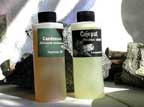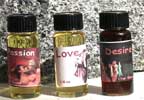"Good Morning Kerry, just an update. I received my replacement Full Moon roll-on intact and wanted to say thank you so much for that. You all are awesome when it comes to serving your customers; communication and otherwise."
~~ Connie C.
"I am a loyal customer. No other oils satisfy me. I love your oils and I am always asked what I'm wearing and I always give your info to 100"s of people... you are always my first stop just as soon as I enter the Texas Renaissance Festival grounds. If you are ever looking for helpers at your booth please contact me - I would absolutely love to help.
Most Sincerely, "
~~ Wendy "Woo" B.
"I just wanted to say thank you for the necklace replacement you sent me and the bottle of oil with it!! Thank you so much for not forgetting about me!"
~~ Melanie F.
"I purchased a vial of your Faerie oil blend...IT SMELLS JUST LIKE MY GREAT GRANDMOTHER....thank you so much for a scent that brings back amazing and happy memories!"
~~ Emily B.
From the times of the ancient Macedonians the wise men and women spoke of the magical healing powers of the plants and herbs. They spoke of boatloads of spices and oils traded from places in the Orient and Mediterranean area. They spoke of frankincense and myrrh and cinnamon as having value near that of gold. Most of the world then enjoyed the herbal healing powers of plants and oils. Sometime about the time Europe and the isles that were to become the British Isles were becoming Christianized, they started to lose the use of the plants and oils. With no way to rid themselves of the insects and fight infections, they fell victim to many illnesses. Some even believe this played a major part in the severity of the plagues that devastated Europe during the Dark Ages. A lot of the knowledge that was retained has come down through the Arabic people and the people of the Far East. Come, enjoy, explore and learn about their magical treasures with us.
WE CHALLENGE YOU!

Here is a current list of our oils. Click on the links to
see the prices for each and more information about each one.
Oils, especially essentials, are marketable commodities and therefore prices may change without notice. We will
certainly do our best to keep them current on the site.
We have a no return policy on our oils. The reason is that
we cannot guarantee that once they are opened that they have not been
contaminated. All oil purchases are final. If you are in doubt of any oil, please request a sample.
Paper catalogs are still free. Just email us a snail mail address.
Click here to access our list of
The Essential Oils 4 oz |
Click here to access our list of
The Fragrance Oils 1 oz |
Click here to access our list of
Our Blends 1/4 oz |
$6.50
The $6.50 covers postage USPS.
Please list your requests here, limit 10 samples per request.
Do you want a print catalog too?
Print Catalog
Perfumes from the East
People have enjoyed perfume for centuries. The hard work of two talented chemists, Jabir ibn Hayyan (born 722 A.D.) and al-Kindi (born 801 A.D.) helped lay the foundations and established the perfume industry. Jabir developed many techniques, including distillation, evaporation and filtration, which enabled the collection of the odour of plants into a vapour that could be collected in the form of water or oil.
Al-Kindi was the real founder of perfume industry as he carried out extensive research and experiments in combining various plants and other sources to produce a variety of scent products. He elaborated a vast number of recipes for a wide range of perfumes, cosmetics and pharmaceuticals. His work in the laboratory is reported by a witness who said "I received the following description, or recipe, from Abu Yusuf Ya'qub b. Ishaq al-Kindi, and I saw him making it and giving it an addition in my presence". The writer goes on in the same section to speak of the preparation of a perfume called ghaliya, which contained musk, amber and other ingredients which reveals a long list of technical names of drugs and apparatus. Musk and floral perfumes were brought to Europe in the 11th and 12th centuries from Arabia, through trade with the Islamic world and with the returning Crusaders. Those who traded for these were most often also involved in trade for spices and dyestuffs. There are records of the Pepperers Guild of London which go back to 1179; their activities include trade in spices, perfume ingredients and dyes.